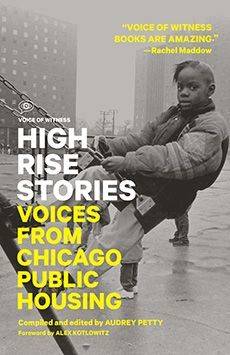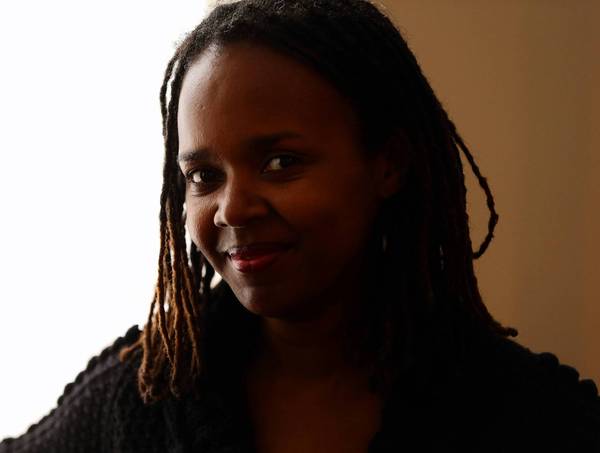Audrey Petty is a writer who understands the politics of the written word. Her work gives the invisible visibility and the silenced a voice. She is a critically recognized short fiction writer, who has been nominated for a Pushcart Award and various other honors. Ms. Petty’s major work to date has been a compilation of interviews with former Cabrini-Green residents, entitled, High Rise Stories: Voices from Chicago’s Public Housing. Amazon.com describes the work as follows, “In the gripping first-person accounts of High Rise Stories, former residents of Chicago’s iconic public housing projects describe life in the now-demolished high-rises. These stories of community, displacement, and poverty in the wake of gentrification give voice to those who have long been ignored, but whose hopes and struggles exist firmly at the heart of our national identity.” A current resident of Chicago, Petty has crossed paths with the C-U community on several occasions, teaching at the U of I before accepting a position with the Clemente Humanities Program. For the upcoming Pygmalion Lit event, I had the opportunity to virtually interview this talented author.
———
Smile Politely: Your collection, High Rise Stories is a series of interviews with former residents of the infamous Cabrini-Green. You’ve discussed your connection as a native of Chicago’s South Side in several interviews. What was the most intriguing revelation you found in the process of collecting these interviews? What is the combined effect of these narratives, and what do you hope the reader takes away from your work on this project?
 Audrey Petty: I don’t think I can single out the single most intriguing revelation I found in my work on High Rise Stories. I believe that this difficulty reflects the power and import of the stories shared. Each one of the narratives offers rich, complex accounts of lives in public housing communities. What I hope is that each narrator makes his or her own deep impression on the reader — that each one comes into view as a rounded individual, and that each story reveals essential truths the narrator was compelled to pass on; I hope that each story also casts shadows for the reader to contemplate. Coming into the interview process, I tried to brace myself for hearing difficult revelations. Tragic stories. I grew up in Chicago, watching the T.V. news and reading the newspapers. I anticipated difficult stories about systemic neglect of public housing, about material deprivation. About hardship, violence, and loss, but I hardly knew anything at all. I wasn’t fully prepared. And beauty in these same stories? I wasn’t prepared for that, either. The stories combine to communicate a great deal about hospitality, friendship, care-giving, creativity and resilience.
Audrey Petty: I don’t think I can single out the single most intriguing revelation I found in my work on High Rise Stories. I believe that this difficulty reflects the power and import of the stories shared. Each one of the narratives offers rich, complex accounts of lives in public housing communities. What I hope is that each narrator makes his or her own deep impression on the reader — that each one comes into view as a rounded individual, and that each story reveals essential truths the narrator was compelled to pass on; I hope that each story also casts shadows for the reader to contemplate. Coming into the interview process, I tried to brace myself for hearing difficult revelations. Tragic stories. I grew up in Chicago, watching the T.V. news and reading the newspapers. I anticipated difficult stories about systemic neglect of public housing, about material deprivation. About hardship, violence, and loss, but I hardly knew anything at all. I wasn’t fully prepared. And beauty in these same stories? I wasn’t prepared for that, either. The stories combine to communicate a great deal about hospitality, friendship, care-giving, creativity and resilience.
SP: As a short story writer of some note, what are the recurring themes in your fictional works? What are your goals of communication for your short stories regarding the human experience?
 Petty: It’s taken me a while to recognize the recurring themes in my stories. What’s clear to me now is that many of them explore visibility and invisibility and concealment. Sometimes characters painfully experience invisibility. Sometimes invisibility comes with distinct benefits. Having completed High Rise Stories, I realize that lots of my stories are also concerned with place. Many characters in my stories feel trapped by their daily settings. They’re restless for an idealized home, someplace where they can more fully be themselves. My preoccupation as a fiction writer is to be a witness to small, complicated human interactions, and to find the words to serve those moments. I’m just returning to writing fiction, after many years of writing nonfiction and working on High Rise Stories. I’m onto something bigger than a short story right now. That’s my hunch. Can’t say much about its themes yet. There’s a big secret that propels the action. One big, shared secret.
Petty: It’s taken me a while to recognize the recurring themes in my stories. What’s clear to me now is that many of them explore visibility and invisibility and concealment. Sometimes characters painfully experience invisibility. Sometimes invisibility comes with distinct benefits. Having completed High Rise Stories, I realize that lots of my stories are also concerned with place. Many characters in my stories feel trapped by their daily settings. They’re restless for an idealized home, someplace where they can more fully be themselves. My preoccupation as a fiction writer is to be a witness to small, complicated human interactions, and to find the words to serve those moments. I’m just returning to writing fiction, after many years of writing nonfiction and working on High Rise Stories. I’m onto something bigger than a short story right now. That’s my hunch. Can’t say much about its themes yet. There’s a big secret that propels the action. One big, shared secret.
SP: You’re also a poet. As a poet, fiction writer, and essayist, who are your favorite writers and why do their works resonate with you?
Petty: I have too many favorites, so I don’t know where to begin. I suppose one place is with writers whose works I’ve often taught. Damballah by John Edgar Wideman is one that springs to mind. I love the book’s many layers — how it unfurls a family history and unearths a family’s mythology; I love the music of Damballah — how stories are shared by multiple voices and how those stories insist that the duet or the chorus is not only vital, but the song is yet another ring of the story. Damballah is a book about memory and community. John Wideman’s Homewood lives inside of me. On my bedside table right now is Deborah Digges’ Rough Music. Come to think of it, it makes terrible nighttime reading for me because Digges’ poems are high voltage. They’re gorgeous and troubling. They absolutely wake me up.
Check out Audry Petty on Thursday evening at 5 p.m. with Peter Orner at Krannert Art Museum.








